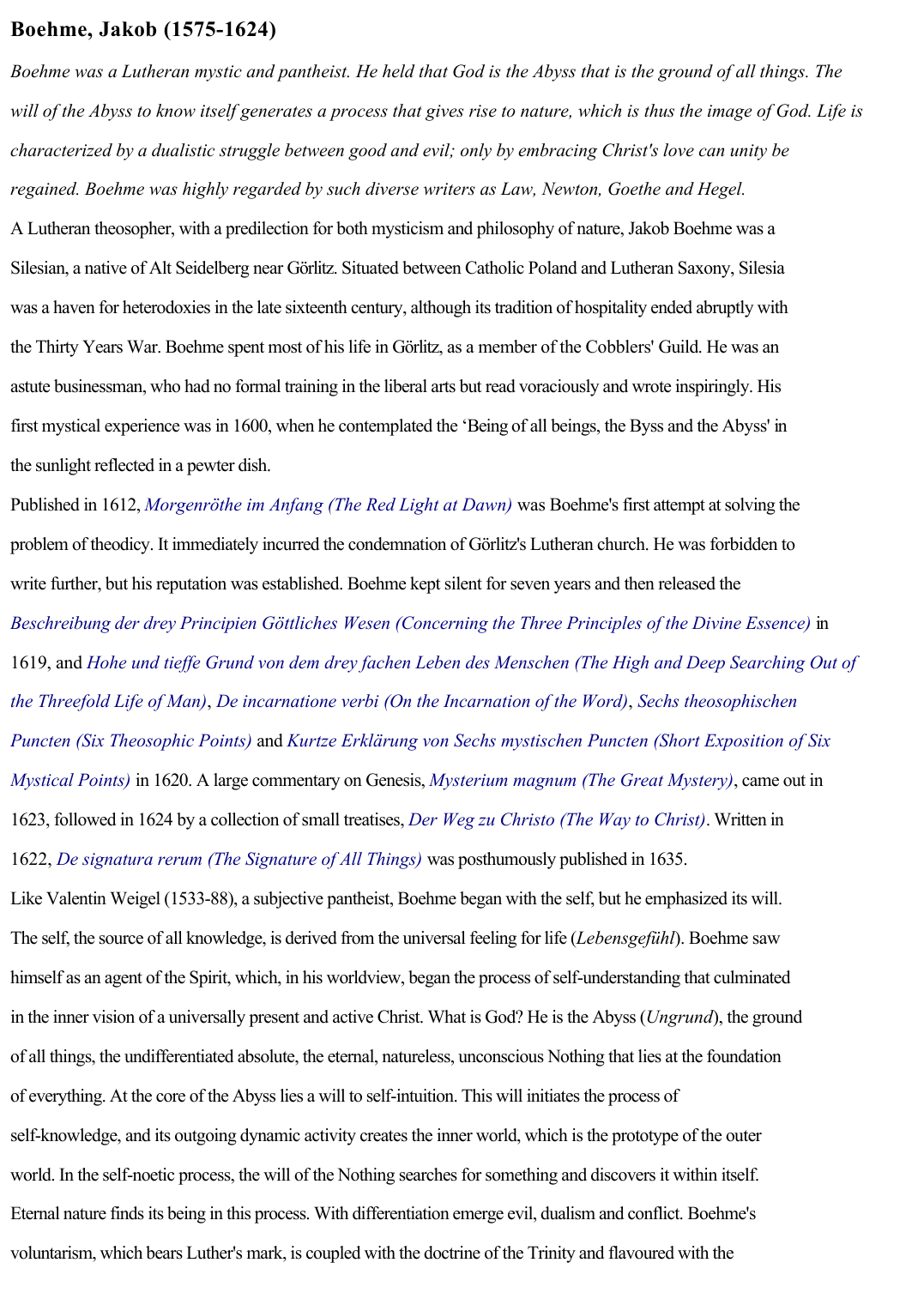Boehme, Jakob
Publié le 16/05/2020

Extrait du document
«
Boehme, Jakob (1575-1624)
Boehme was a Lutheran mystic and pantheist.
He held that God is the Abyss that is the ground of all things.
The
will of the Abyss to know itself generates a process that gives rise to nature, which is thus the image of God.
Life is
characterized by a dualistic struggle between good and evil; only by embracing Christ's love can unity be
regained.
Boehme was highly regarded by such diverse writers as Law, Newton, Goethe and Hegel.
A Lutheran theosopher, with a predilection for both mysticism and philosophy of nature, Jakob Boehme was a
Silesian, a native of Alt Seidelberg near Görlitz .
Situated between Catholic Poland and Lutheran Saxony, Silesia
was a haven for heterodoxies in the late sixteenth century, although its tradition of hospitality ended abruptly with
the Thirty Years War.
Boehme spent most of his life in Görlitz , as a member of the Cobblers' Guild.
He was an
astute businessman, who had no formal training in the liberal arts but read voraciously and wrote inspiringly.
His
first mystical experience was in 1600, when he contemplated the ‘Being of all beings, the Byss and the Abyss' in
the sunlight reflected in a pewter dish.
Published in 1612, Morgenröthe im Anfang (The Red Light at Dawn) was Boehme's first attempt at solving the
problem of theodicy.
It immediately incurred the condemnation of Görlitz's Lutheran church.
He was forbidden to
write further, but his reputation was established.
Boehme kept silent for seven years and then released the
Beschreibung der drey Principien Göttliches Wesen (Concerning the Three Principles of the Divine Essence) in
1619, and Hohe und tieffe Grund von dem drey fachen Leben des Menschen (The High and Deep Searching Out of
the Threefold Life of Man) , De incarnatione verbi (On the Incarnation of the Word) , Sechs theosophischen
Puncten (Six Theosophic Points) and Kurtze Erklärung von Sechs mystischen Puncten (Short Exposition of Six
Mystical Points) in 1620.
A large commentary on Genesis, Mysterium magnum (The Great Mystery) , came out in
1623, followed in 1624 by a collection of small treatises, Der Weg zu Christo (The Way to Christ) .
Written in
1622, De signatura rerum (The Signature of All Things) was posthumously published in 1635.
Like Valentin Weigel (1533-88), a subjective pantheist, Boehme began with the self, but he emphasized its will.
The self, the source of all knowledge, is derived from the universal feeling for life ( Lebensgefühl ).
Boehme saw
himself as an agent of the Spirit, which, in his worldview, began the process of self-understanding that culminated
in the inner vision of a universally present and active Christ.
What is God? He is the Abyss ( Ungrund ), the ground
of all things, the undifferentiated absolute, the eternal, natureless, unconscious Nothing that lies at the foundation
of everything.
At the core of the Abyss lies a will to self-intuition.
This will initiates the process of
self-knowledge, and its outgoing dynamic activity creates the inner world, which is the prototype of the outer
world.
In the self-noetic process, the will of the Nothing searches for something and discovers it within itself.
Eternal nature finds its being in this process.
With differentiation emerge evil, dualism and conflict.
Boehme's
voluntarism, which bears Luther's mark, is coupled with the doctrine of the Trinity and flavoured with the.
»
↓↓↓ APERÇU DU DOCUMENT ↓↓↓
Liens utiles
- Jakob Boehme (ou Böhme) (1575-1624)
- Biographie de BOEHME (Jakob).
- Lenz, Jakob.
- Johannes Brahms par Carl Schuricht Le 7 mai 1833, Johann-Jakob Brahms, pauvre musicien de Hambourg, eutun fils qu'on nomma Johannes.
- Jakob Henle1809-1885Anatomiste, de Göttingen, à qui l'on doit la découverte des tubes du rein qui portent sonnom, de l'endothelium des vaisseaux sanguins, des cellules du foie, etc.


